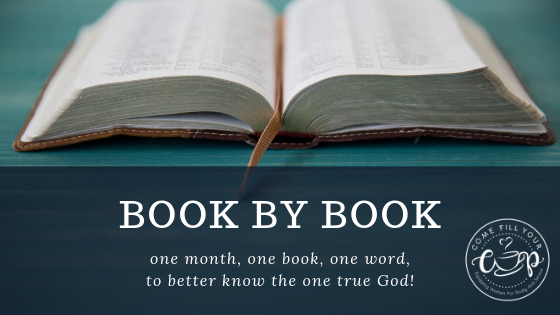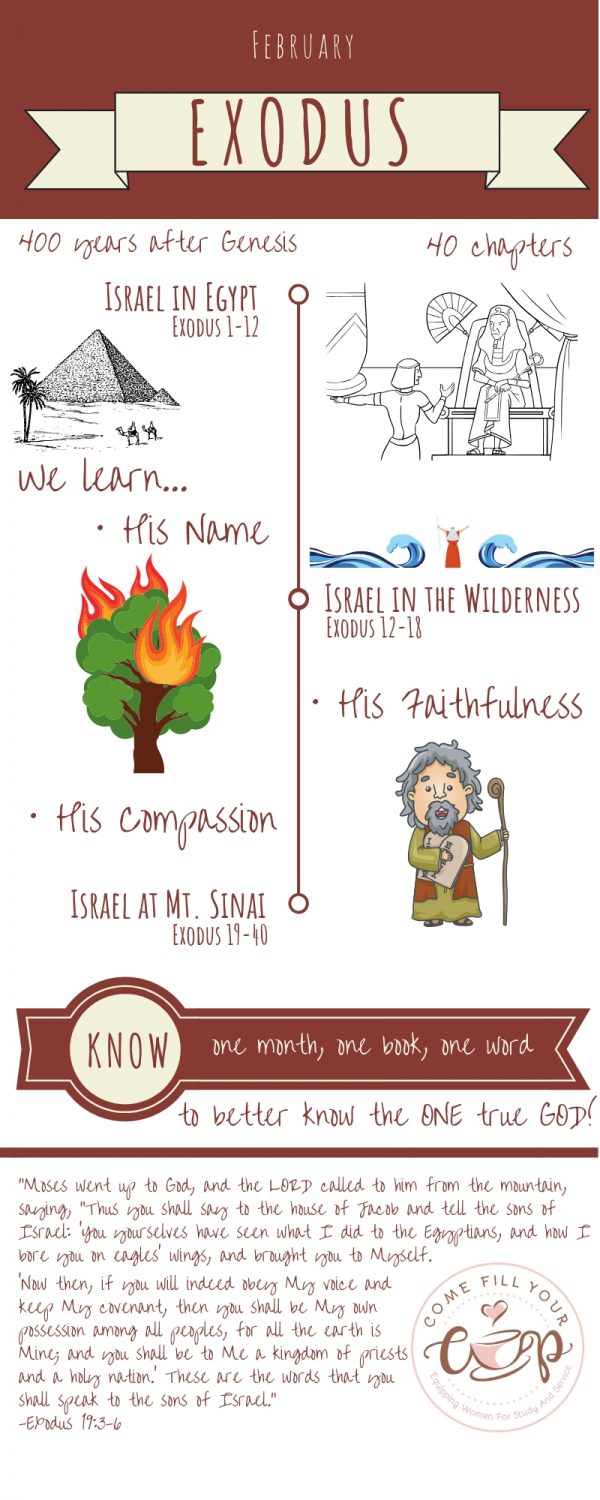
As arguably the most action-packed and drama-filled book of the Bible, it’s no wonder that Hollywood has capitalized on several films based on the book of Exodus. The real script that only the God of Heaven could direct, opens some 400 years after Genesis concludes. Despite the time gap, it is a continuation of God’s promise to Abraham (Gen 12:1-3): to bring about a great nation, to give land as in inheritance, and bring about redemption for all. Joseph’s family have prospered and multiplied, but they find themselves in an unfavorable political climate (Ex. 1:8ff). As God prepares to remove them from Egyptian oppression, we quickly learn that it is just as much about the deliverance to something new as it is about the “exit”! They become a new nation with a new leader, new laws, a new way of worship, but most importantly, a new God to whom they must be introduced.
 Throughout their journey are some of the greatest displays of God’s mighty wonders and signs in all the Old Testament. We see the successes and the struggles of Moses, Aaron, and the other individuals through whom God is working. With post-Calvary eyes, we can look backward at the rich types and shadows of our Passover Lamb and parallels of the way God takes us, spiritual Israel, out of sin’s slavery into His house. What Exodus also details is the Israelites growing understanding of, reliance upon, and relationship with Yahweh. Since the purpose of our “Book by Book” study it to better know God, it’s on this last theme that we’ll focus for the rest of our summary. The 40 chapters of Exodus can be divided into 3 main categories: Israel in Egypt (1-12), Israel in the wilderness (12-18), and Israel at Mt. Sinai (19-40). What do we learn about God in them?
Throughout their journey are some of the greatest displays of God’s mighty wonders and signs in all the Old Testament. We see the successes and the struggles of Moses, Aaron, and the other individuals through whom God is working. With post-Calvary eyes, we can look backward at the rich types and shadows of our Passover Lamb and parallels of the way God takes us, spiritual Israel, out of sin’s slavery into His house. What Exodus also details is the Israelites growing understanding of, reliance upon, and relationship with Yahweh. Since the purpose of our “Book by Book” study it to better know God, it’s on this last theme that we’ll focus for the rest of our summary. The 40 chapters of Exodus can be divided into 3 main categories: Israel in Egypt (1-12), Israel in the wilderness (12-18), and Israel at Mt. Sinai (19-40). What do we learn about God in them?
While Israel is in Egypt, we learn His name (Ex 3:13-15, 6:2-3). It may seem insignificant, but the formation of great relationships almost always begins with the introduction of names! We see His compassion toward His people (2:24, 6:5) and His faithfulness in keeping His covenants – a significant theme and keyword throughout the book. With great awe we see God’s mighty power overtake nature again and again. Can you imagine witnessing those events with your own eyes?
When Israel transitions into the wilderness there is a deepening of trust in the relationship. They’ve seen that He is able! His patient and caring nature is evident here as He provides for the nation’s physical and emotional needs: manna/quail, water, protections from enemies, and visual representations of His presence!
The entire book comes to a climax as the Children of Israel reach Mt. Sinai, and Chapter 19 opens with a great thesis statement of the entire book.
“Moses went up to God, and the LORD called to him from the mountain, saying, “Thus you shall say to the house of Jacob and tell the sons of Israel:‘You yourselves have seen what I did to the Egyptians, and how I bore you on eagles’ wings, and brought you to Myself. ‘Now then, if you will indeed obey My voice and keep My covenant, then you shall be My own possession among all the peoples, for all the earth is Mine; and you shall be to Me a kingdom of priests and a holy nation.’ These are the words that you shall speak to the sons of Israel.” – Exodus 19:3-6
As God dictates the law and specifications for His new dwelling, the words offer/offering, and tabernacle/sanctuary are keywords in this section. They beautifully illustrate the give and take necessary for a faithful relationship with the Father. It’s especially comforting to know that our God is like no other gods in that He desires to dwell with us (Ex. 25:8)!
I’m excited about this month’s challenge. The word is “know” and in particular the verses that contain the phrases “may know” and “shall know”. It’s not the most used word in the book, but it is a significant theme – God desires to know His people and to make Himself known to the world! I appreciate that these phrases are often found in conjunction with something mighty that God has done. He’s not just out there flexing His muscles, there is a reason. He gives purpose to His actions and appeals to our human nature of wanting to know why things are happening! As you read, ask yourself “Who is speaking and who are they addressing?” “What is God wanting to make known about Himself?” “What does He know about me?” As you pray, pray like Moses prayed in Ex. 33:13-18. In a book that is overflowing with deep spiritual concepts, it’s refreshing to be reminded that the One who directed the parting of the sea knows us and wants us to know Him!
Kathryn Baker
- Book by Book: Esther - November 18, 2020
- Book by Book: Nehemiah - July 22, 2020
- Book by Book: Ezra - May 27, 2020
 Welcome! We are so glad you stopped by. Come Fill Your Cup is a group of Christian ladies dedicated to equipping women for study and service. We know you are busy and that life’s hectic pace pulls you in so many directions, but you can’t truly be the woman God desires unless you take time to fill your own cup…not with spa days (though we love a good spa!) or the latest novel…but with God’s Holy Word. We want to help you with that! Our goal is to reach you in the midst of your busy day and give you encouragement, education, and fellowship as you strive to live the life God has laid before you. Our prayer is that we can help fill your cup so that you, in turn, can overflow to all those around you. So, as we like to say…come fill your cup, and let it overflow!
Welcome! We are so glad you stopped by. Come Fill Your Cup is a group of Christian ladies dedicated to equipping women for study and service. We know you are busy and that life’s hectic pace pulls you in so many directions, but you can’t truly be the woman God desires unless you take time to fill your own cup…not with spa days (though we love a good spa!) or the latest novel…but with God’s Holy Word. We want to help you with that! Our goal is to reach you in the midst of your busy day and give you encouragement, education, and fellowship as you strive to live the life God has laid before you. Our prayer is that we can help fill your cup so that you, in turn, can overflow to all those around you. So, as we like to say…come fill your cup, and let it overflow!
Leave a Reply